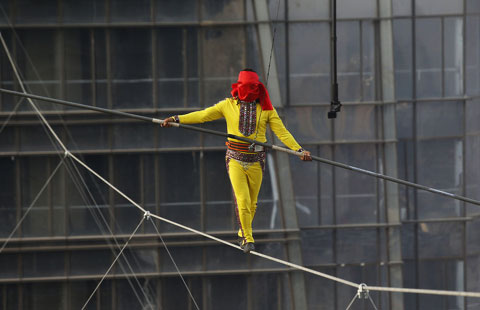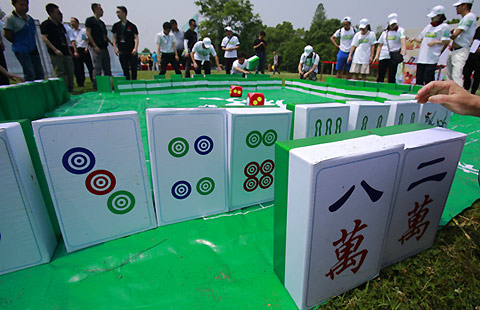Global badminton competition heats up
Updated: 2015-05-18 16:44
By Sun Xiaochen(chinadaily.com.cn)
|
||||||||
Despite the mighty dominance of Chinese badminton players, the narrowing gap between China and the rest of the world highlighted at the 2015 Sudirman Cup suggests that the game is becoming more competitive.
Although China's sixth consecutive win at the world mixed team championships was anticipated, the progress achieved by international teams challenging China's supremacy bodes well for the future of the game, said coaches and players.
"We can see from this tournament that the overall level of world badminton has improved a lot over the years. A growing number of elite players have emerged from around the world, making more trouble for us," Li Yongbo, head coach of the Chinese national team, said after China's 3-0 victory over Japan to win the prestigious cup for a record 10th time on Sunday.
"The margin has been closing while the competition is becoming more unpredictable. It's a positive sign for the game but we definitely have to prepare better for a tough Olympic tournament next year," Li added.
Boasting comprehensive in all disciplines, China didn't meet legitimate threats at the mixed team tournament, conceding only one match in men's doubles in the 3-1 semifinal victory over Indonesia.
However, a series of defeats at earlier events signified that the China is not as invincible as before against a field of improved international challengers.
Thai star Ratchanok Intanon and Spanish player Carolina Marin both stunned China's female world No 1 Li Xuerui to win the women's singles title at the World Championships in 2013 and 2014.
At the 2014 Thomas Cup men's team world championships, Japan dashed China's bid for a record sixth straight title with a semifinal upset before South Korea delivered another blow by beating China in the men's team final at the Incheon Asian Games.
"We have been getting closer (to China) over the last three years. The Thomas Cup win motivated our players. Not only can Japan fight against China, other teams can do as well," said Japan's head coach Park Joo Bong from South Korea.
To remain a leading force in the racquet sport, China should be aware of improved players from the around the world, said star veteran Lin Dan.
"I never took the failure (to Japan at the Thomas Cup) as a surprise nor any of the troubles we had here, because a lot of our rivals have made obvious progress," said the two-time Olympic champion.
Female Olympic champion Li said "the technical edge China once held over others has become much thinner than before".
Although European teams Denmark and Germany advanced into the quarters, the Dongguan tournament remained an Asian-dominated party. No Western country has ever touched the trophy since the cup was initiated in 1989.
Badminton World Federation President Poul-Eric Hoyer said he expected to see China get more involved in helping the rest of the world raise their game.
"China has been a strong powerhouse for so many years. For us, we need to get the inspiration from the Chinese players. I can say that I am very happy to see quite a number of Chinese players being coaches in other countries and they are doing a good job.
"Hosting foreigners to come to China to practice in one of the centers here would be a very good thing as well," said Hoyer, who was the men's singles gold medalist at the 1996 Atlanta Olympics.
Thanks to the export of Chinese training expertise, Europe has produced a handful of elite athletes including Spain's female world No 3 Carolina Marin and Denmark's male No 2 Jan Jorgensen.
"It was good for us to compete against China on a high level. We help each other to improve mutually," said Marin.
German veteran Marc Zwiebler said he appreciates the opportunity to play against the Chinese team.
"It's good for us, we don't have any pressure. They are the favorite. For us it's easy to play, we are the underdogs," he said.

 China, Ireland sign agricultural deals
China, Ireland sign agricultural deals
 Monks practice martial art at Quanzhou Shaolin Temple
Monks practice martial art at Quanzhou Shaolin Temple
 The world in photos: May 11-17
The world in photos: May 11-17
 Daredevil breaks blindfolded tightrope walking record
Daredevil breaks blindfolded tightrope walking record
 Helicopter-hailing app sees huge response for ride over Beijing
Helicopter-hailing app sees huge response for ride over Beijing
 Ten photos you don't wanna miss - May 18
Ten photos you don't wanna miss - May 18
 Huge mahjong tiles challenge participants
Huge mahjong tiles challenge participants
 Palace Museum to limit daily visitor number by 80,000
Palace Museum to limit daily visitor number by 80,000
Most Viewed
Editor's Picks

|

|

|

|

|

|
Today's Top News
Premier eyes growth points on Brazil trip
9 dead in shootout in Texas
Alibaba denies luxury group's counterfeit claim
J-10 fighter jet 'good choice for Argentina'
China, US should not let distractions derail ties: Xi
China, Ireland sign agricultural deals
Chinese premier's visit to LatAm to enhance capacity cooperation
Chinese tennis player Li Na's life story to become a film
US Weekly

|

|







